Civil war in Myanmar: Bangladesh should revisit its national security strategy

As fighting between the military junta and ethnic groups rages on in war-torn Myanmar, its neighbours Bangladesh, India, China and Thailand are finding it difficult to keep violence off their own borders.
Bangladesh, for instance, is facing major national security challenges at multiple layers as a result of the uncontained and reckless fighting between the Myanmar military and the armed rebel groups.
Intense gun battle along the Naf River, earlier this month, cut off Bangladesh's communications with its only coral island, St Martin's, located about nine kilometres off the mainland, for about a week. As a result, the island, with a population of about 11,000, was exposed to security risk and essential supplies crisis. Around the same time, heavy explosions along the Naf also caused panic among the residents of Shah Porir Dwip, another island situated at the southernmost point of Bangladesh. It was also reported that a Myanmar warship had been spotted opposite the island.
Indeed, these fears and security concerns are not unfounded. Since 2022, Myanmar has continuously violated Bangladesh's territorial integrity, with the former violating the latter's air space as early as in September 2022, with two shells falling inside the Bangladesh territory, and multiple rounds being fired from fighter aircraft.
As fighting between the factions and Myanmar military escalated, multiple killings and injuries were reported inside Bangladesh's territory. In February this year, two were killed by a mortar shell fired by Myanmar on Bandarban's Gumdhum border, with a child being injured. As recently as April this year, two Bangladeshi fishermen in Teknaf were injured when Myanmar's Border Guard Police (BGP) opened fire.
The misadventures, if not provocative posturing, by both the Myanmar military and the armed rebel groups around the Bangladesh borders, including in the Bay of Bengal, pose major threat to Bangladesh's national security. The Bangladesh government must be commended for the restraint it has exercised in addressing the situation so far, but it seems that this patience is being misinterpreted by all the factions in Myanmar. While Bangladesh keeps trying to address the situation through meaningful dialogues in a constructive approach, the Myanmar factions have been pushing the nation further to the brink: Bangladesh has now threatened counterfire if Myanmar resumes violent activities along the restive border areas.
However, the security concerns for Bangladesh does not end here. It has been reported by multiple media sources that armed gangs operating inside Rohingya camps inside Bangladesh—Rohingya Salvation Organization (RSO), Arakan Rohingya Army (ARA), and Arakan Rohingya Salvation Army (ARSA)—are actively and forcefully recruiting Rohingya men and boys (as young as 12) to fight in the civil war. In cases where the refugees are understandably unwilling to join, they are being kidnapped by the gangs. It has even been suggested that the recent arson incidents in the Kutupalong camp have been orchestrated by these gangs to coerce the refugees into joining the civil war. A recent turf war between ARSA and RSO has resulted in the death of three refugees.
What is even more alarming is that many of the refugees who have been forced away from the camps are currently being held inside the Bangladesh territory in the depths of the Bandarban hills, waiting to be pushed into Arakan. Many of the refugees, fearing illegal conscription by the various factions, including the Tatmadaw proxies, are voluntarily fleeing the camps and randomly spreading out across the greater Bandarban region, where it has been alleged that they are trying to assimilate with the locals.
If this is indeed the case, then the local authorities should beef up surveillance to avert internal security risks, given that the refugees are vulnerable to being manipulated by various quarters to serve their vested interests, and there is a high risk that the ones who are fleeing the camps could also potentially be exploited by groups with nefarious intentions.
In addition, Bangladesh has witnessed a new influx of refugees in recent months, as anticipated earlier, in the face of growing violence in the Rakhine state. A Bangladeshi official involved in refugee relief and repatriation told the media that many of the new refugees have been allowed to enter into Bangladesh territory unofficially. While Bangladesh has been generous in opening its doors to the Rohingya refugees, allowing them to do so unofficially or without tracking and accountability is a crisis in the making.
It is a no-brainer that in a desperate situation such as this, it would be difficult to keep the refugees from crossing over into Bangladesh. Under the current circumstances, without beefing up border security—and if required, ensuring a safe, official passage of the recently displaced Rohingya—infiltration would continue, resulting in the creation of small, sporadic pockets of illegal refugee settlement across the Chittagong Hill Tracts (CHT). The people in these pockets, desperate and vulnerable to the lures of various vested groups, can pose national security threats in the medium to long terms.
Bangladesh needs to revisit its national security strategy and adapt it to effectively navigate the shifting landscape. We need a multipronged approach to mitigate the emerging security threats.
First, we must acknowledge that our border security needs immediate attention and should do a thorough risk analysis with the support of defence experts and analysts, and come up with a comprehensive plan to counter these challenges.
Second, instead of hoping that the Rohingya refugees would not cross into Bangladesh, we should take stock of the situation and if required allow them official safe passage with strict monitoring of their whereabouts. This would be better than the refugees illegally infiltrating and then spreading across the greater CHT region, without any sight of their movement.
Third, the government should work in close collaboration with key regional players including India and China, since both have leverage with the Myanmar military and the armed factions in some cases, especially China—earlier this year, China brokered a ceasefire between the Myanmar junta and the armed groups—to convince all the parties to come to a negotiating table and discuss and ink a sustainable permanent ceasefire.
Fourth, Bangladesh should continue using diplomatic channels to convince the international community to increase funding for the desperate Rohingya refugees, whose living conditions have declined over the years with aid dwindling fast.
Finally, the Bangladesh government should negotiate a practical and sustainable repatriation deal for the refugees with the Myanmar authorities with the mediation of China. Once peace is restored in Myanmar, China can play a pivotal role by leveraging their influence to offer the refugees a dignified life in their own homeland with full citizenship, rights and security.
The Myanmar civil war is the result of decades of non-democratic rule by authoritative, military regimes, resulting in the persecution of minority groups, which has inflicted deep wounds within the communities. Its solution lies in the return of democracy and acceptance of all its people. The wounds are deep, but in a true democratic system, with rights and dignity restored to all the ethnic groups and communities, and everyone given their due representation and voice, Myanmar can heal, and prosper even, realising the full potential of the diversity the country is gifted with.
In light of the ongoing situation, it is high time Bangladesh revised its national security strategy and worked in close collaboration with the other key regional players to help Myanmar find peace.
Tasneem Tayeb is a columnist for The Daily Star. Her X handle is @tasneem_tayeb.
Views expressed in this article are the author's own.
We welcome your contributions and analysis of global events, and responses to our articles. To submit articles to Geopolitical Insights, please send an email to [email protected].
Follow The Daily Star Opinion on Facebook for the latest opinions, commentaries and analyses by experts and professionals. To contribute your article or letter to The Daily Star Opinion, see our guidelines for submission.

 For all latest news, follow The Daily Star's Google News channel.
For all latest news, follow The Daily Star's Google News channel. 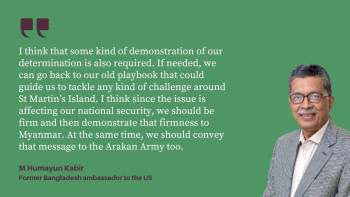
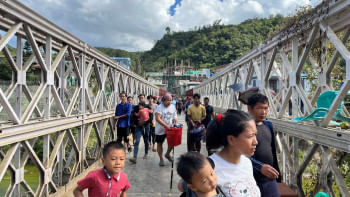
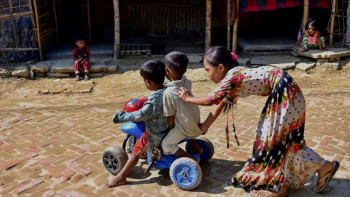



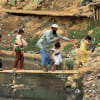

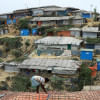


Comments